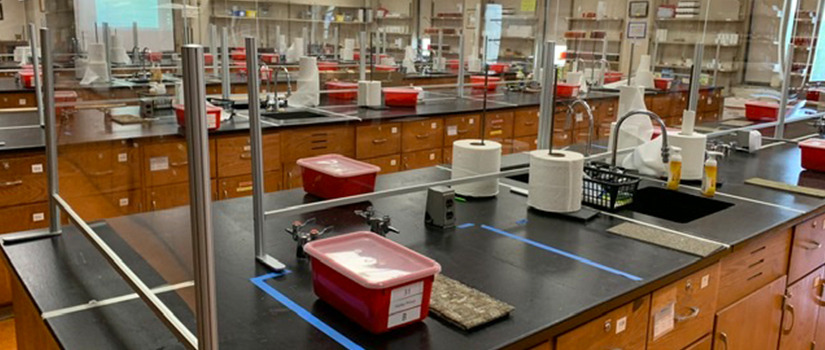Posted on: September 14, 2020
As the beginning of the fall semester approached, College of Pharmacy professors and staff focused on preparing their classrooms for socially distanced learning as required by the university’s risk mitigation plan. One of the greatest related challenges in the College of Pharmacy centered on setting up the lab for Pharmacy Skills Lab I: Compounding and Applied Pharmaceutics, the introductory class to compounding and pharmaceutics for first-year students, taught by Kathy Quarles Moore, R.Ph., lab director of the community and compounding labs.
Because the class is a hands-on learning experience, Quarles Moore reformatted the class for optimal face-to-face learning, while determining logistics to ensure the safety of both herself, her teaching assistants and the students.
I would normally walk through the class, helping each student one-on-one as needed. I couldn’t do that with the COVID-19 restrictions.
Kathy Quarles Moore, R.Ph. Assistant Professor, College of Pharmacy
“We worked through several plans before landing at what we felt best meets our needs for a successful learning experience,” Quarles Moore says. “I am very much a hands-on professor, and I would normally walk through the class, helping each student one-on-one as needed. I couldn’t do that with the COVID-19 restrictions.”
Working closely with the college’s information technology team, Quarles Moore and her teaching assistants refreshed the lab’s technology capabilities to include a new room control system, ceiling microphones, projectors and cameras. Each student works in a defined area, separated by plexiglass.
“The new technology allows me to teach from the front of the room and demonstrate techniques in real time,” she says. “The class is split into two groups that come at separate times, three days a week, and we thoroughly clean between each class. The techniques they learn are significant because each week builds on what the students learned the prior week.”
The most important part of learning is for me to have a connection with the students, and we achieved that.
Moore is especially grateful to the students who showed a great deal of initiative in helping her not only find the right solution for the lab set-up but those who also helped her community lab class transition to a virtual lab last spring semester. “I was able to bounce ideas off of them, and they helped design the layout for the plexiglass, labeling of bins to hold the student’s work, and helping us prepare to follow the United States Pharmacopeia (USP) guidelines,” she adds. “We are a well-oiled machine, and everyone played a significant part.”
Students who assisted with the community virtual lab include Ryan Ward, Haley Cave, Taylor Byrd, Lauren Walters, Ben Carabo and Katey James. Fourth-year students who worked to set up the compounding lab are Cassidy Hall, Heather Daugherty, Tabatha Young, Caleb McClellan and Raegan Kennedy.
She also credits College of Pharmacy alumnus and Clinical Instructor Stan Papajohn for providing consultation and insight. “He helped us determine what would and wouldn’t work,” she adds. “I was able to bounce ideas off him. He is always my voice of reason – my wise counsel!”
The effort put into the extensive preparations paid off. Quarles Moore feels the first few days of lab went smoothly. “Our system worked, and the plan was implemented well,” she says. “The most important part of learning is for me to have a connection with the students, and we achieved that.”
